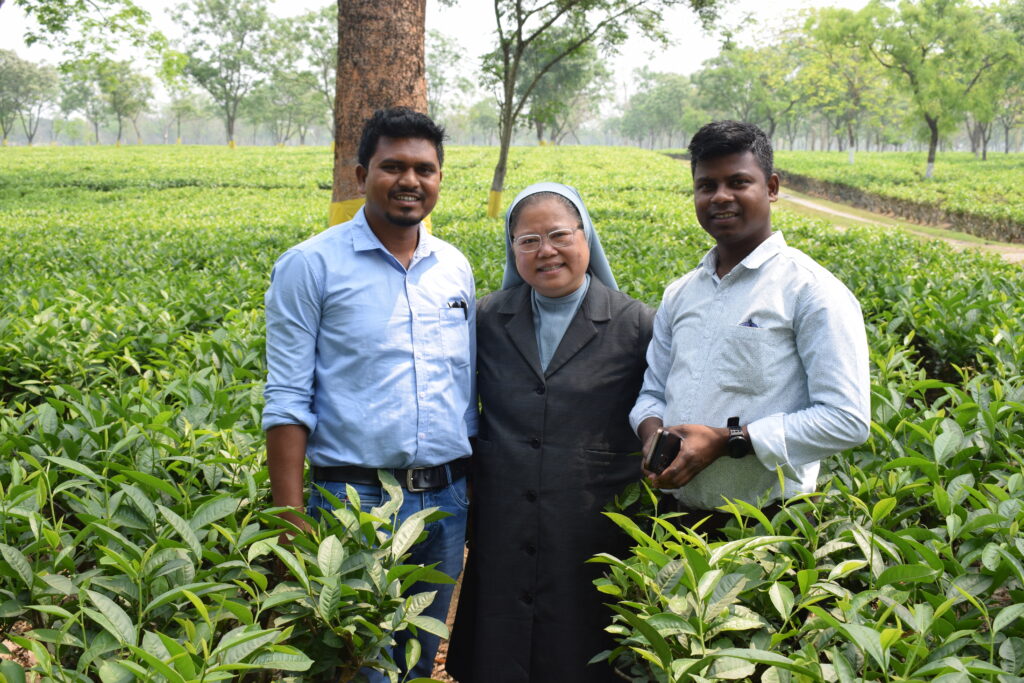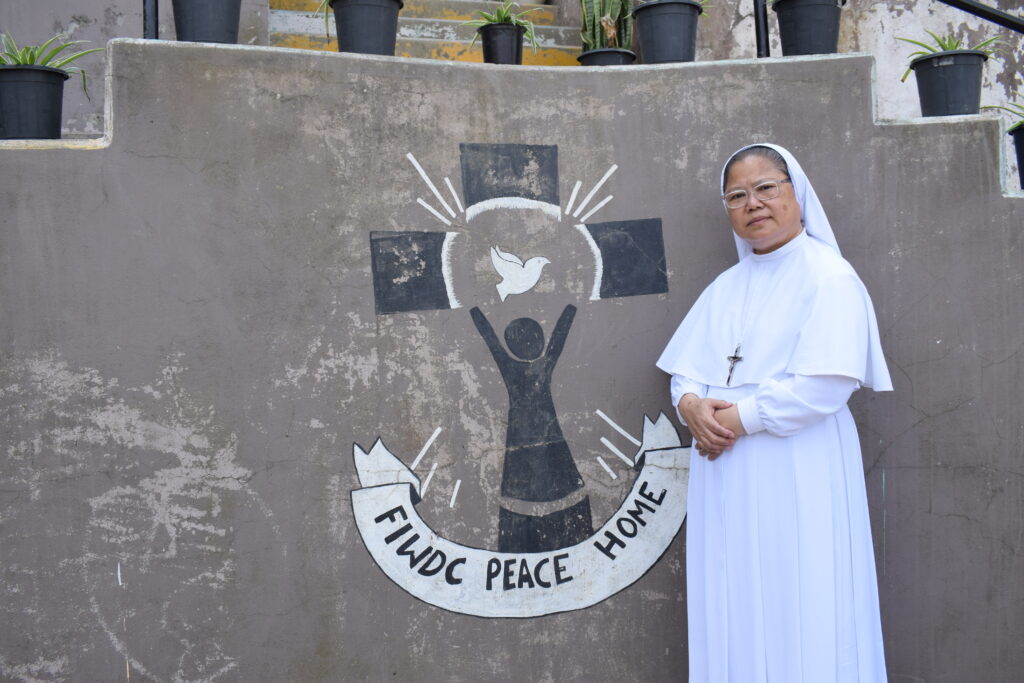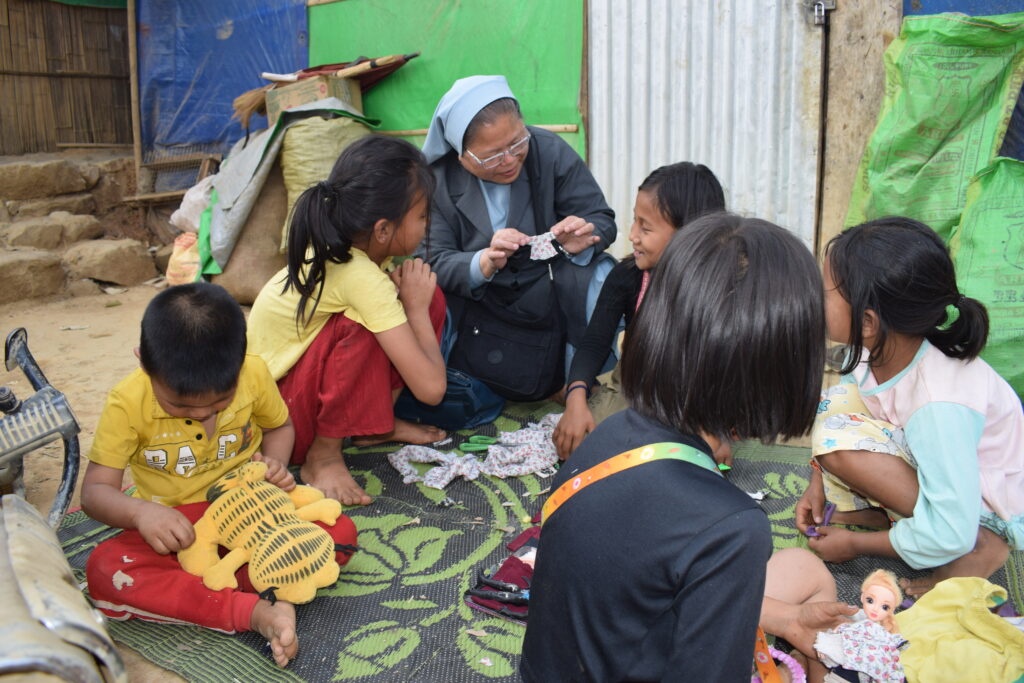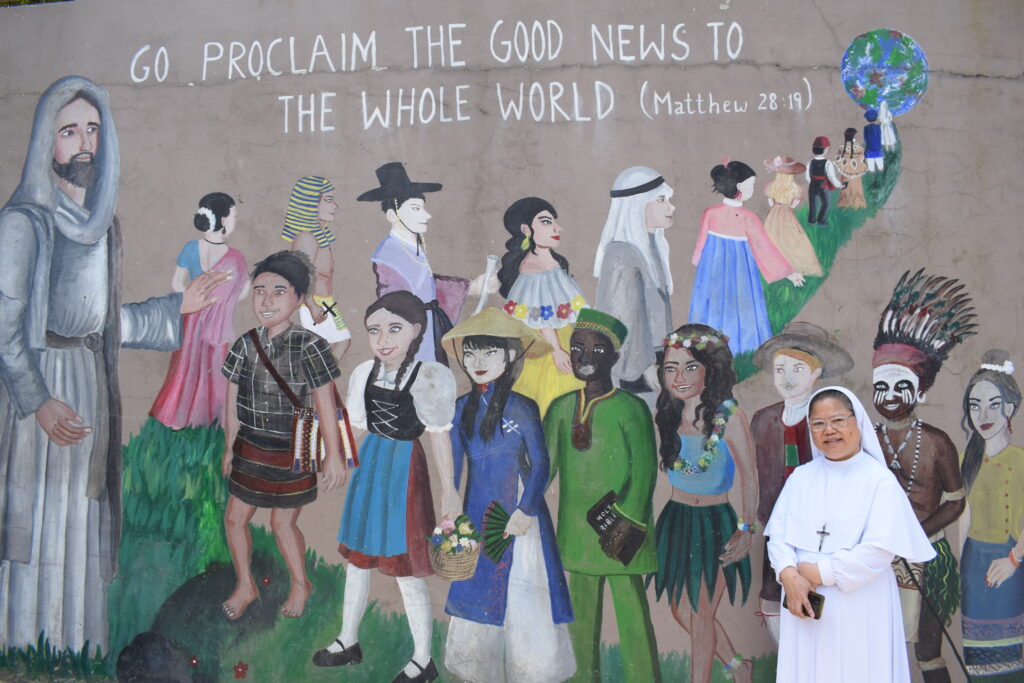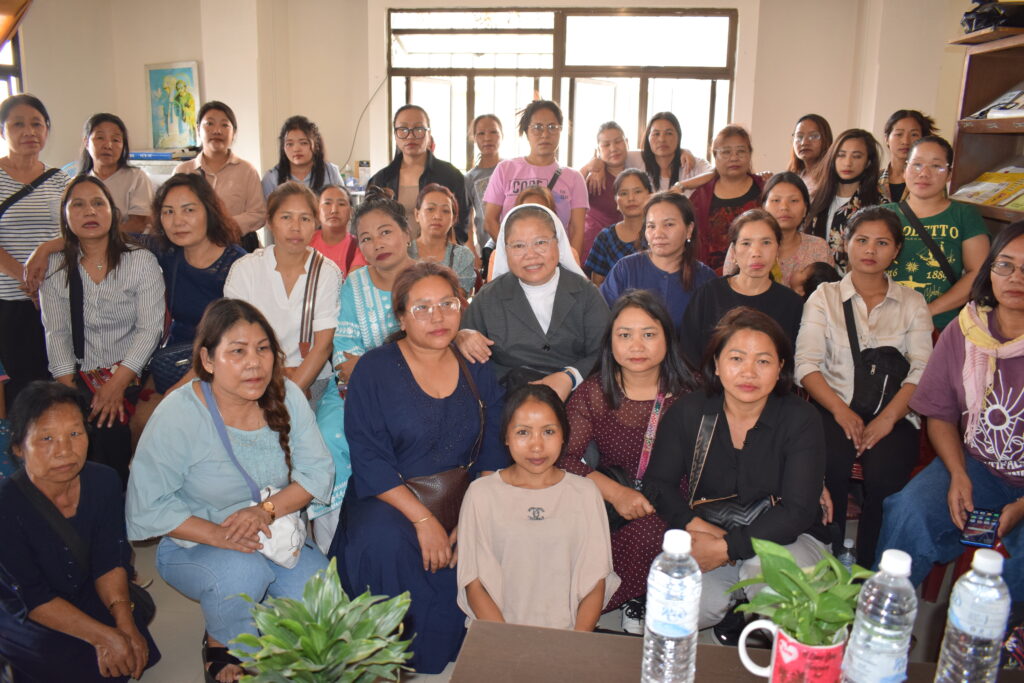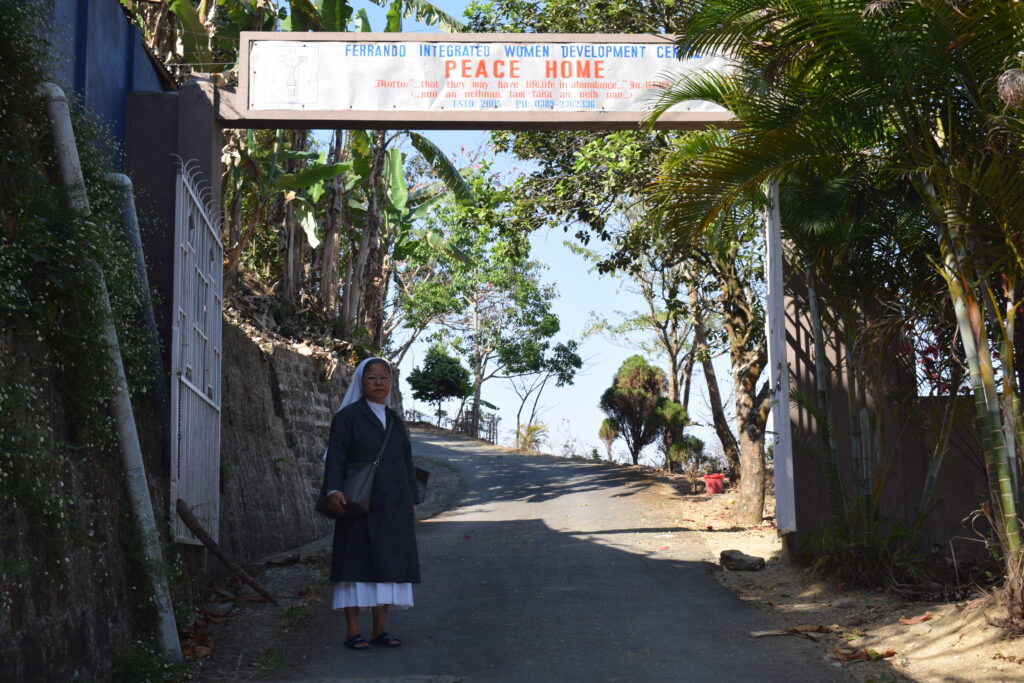Sacred-Centered Work on the Margins: A Nun's Mission from the Tea Gardens of Assam to the Borders of Mizoram
Content Warning: This article contains content that some readers may find distressing, including references to violence, trauma, and other sensitive subject matter. Please take care while reading.
Three years ago, Sister Rose Paite had an important task. Tribal teenager Romila Murmu had been abducted from her village surrounded by acres of tea gardens in the remote Kokrajhar district of Assam. She was then ferried through mountainous terrain to Nagaland, 550 miles away in Northeast India.
On being rescued, Murmu — then heavily pregnant — turned to Paite as her only hope. Murmu was revived by the Catholic nun’s mission to save girls from traffickers who scout for potential victims on the margins of India’s villages.
“Sister Rose saved my life,” said Murmu, on a sultry afternoon in her village home in Kokrajhar skirted by tea shrubs and paddy fields. “She took care of my delivery, gave me food and medicines.”
Paite is a 62-year-old member of Talitha Kum, a network of Catholic nuns fighting human trafficking around the world. She’s made it her life’s mission to work for marginalized and vulnerable women overcoming everything from refugee migration to addiction. The problems she combats are symptoms of broader spiritual disconnections — from self-worth, communal belonging, neighborly love. Whether they are supporting survivors of trafficking or addiction, refugees, or other marginalized women, Paite and her network respond to what’s often not articulated, to the harm that needs healing below the surface. The questioning of faith, beliefs, values, belonging — even identity.
Paite and her collaborators understand the pain of this spiritual fracturing. Through prayer, meditation, mindfulness, and acts of service, Patie helps those who have been harmed or opposed to create deeper self-awareness and connection with the inner self so that they may understand their place in the world.
Until 2024, Paite helmed the social apostolate of the Missionary Sisters of Mary Help of Christians that was founded in 1942 as the first indigenous congregation in northeast India. For twelve years she ventured into the remote northeast, expanding her work both geographically and demographically. Across 75 villages in Assam, the Catholic nun has also set up vigilante committees that have been working round-the-clock to spot potential traffickers.
In her crisp white tunic, gray veil and simple country slippers, Paite moves from one village to the next offering comfort and spiritual guidance to suffering families. She inspires them to deepen their faith and connection with the divine. During meetings with indigenous communities, she tells them their collective action and traditional knowledge are not only critical to fighting off exploitation by tea garden managers and wealthy landlords, but also for their self-determination and cultural preservation. At the heart of this work is embodied compassion and empathy that transcends backgrounds and experiences.
Paite’s belief that those in extreme poverty deserve sustained support and healing is what motivates her work to empower indigenous communities. In their faces she sees “Jesus, the Messiah who endured emotional trauma and spiritual agony.” Thus, she embraces the marginalized regardless of caste, gender or religious identities. Caring for the community has always been a divine act drawn from the understanding that every life is sacred.
Growing up, Paite had an idealistic view of religion. At school, stories of saints and religious figures fascinated her for they spoke to her belief in a world full of compassion and acts of giving to those in need. Yet, after taking her final vows to become a nun in 1993, she felt conflicted about her decision.
She didn’t want to just commit to prayer, contemplation and service within a religious order. She wanted to touch the lives of marginalized people in the farthest corners of the country where a multitude of interconnected problems permeated society, including poverty, social and gender inequalities, and caste-based discrimination.
“I didn’t know anything about the Catholic church because of our humble upbringing,” said Paite. “All I knew was I wanted to use my spiritual gifts to bridge divides and bring people closer together even in very divided communities.”
She was initially assigned to serve in Champhai, a border town rich in agriculture and trade situated between Mizoram, in Northeast India, and Myanmar. When a senior nun asked her what she wanted to do in this remote area, the answer came from what she calls a “heart-centered space.” Paite wanted to help drug addicts in Mizoram, a state where over 1,800 people have reportedly died from substance abuse since 1984, according to the state excise and narcotics department.
In Champhai, while integrating herself with the community of those struggling with addiction and listening to their stories, her belief became stronger that she didn’t want to be a nun in name only, but rather a changemaker and a “voice for the voiceless.”
“Sister Rose is a true visionary,” said Bibiana Kamei, a Catholic nun with the indigenous congregation in Champhai. “She challenged herself to learn yoga, meditation, psycho-therapeutic counselling, and acquainted herself with international mutual aid programs supporting recovery from addictions.”
Through her own journey of self-discovery while working with these communities, Paite eventually built her own integrated women’s development center, Peace Home, in 2005.
“I wanted to uplift them emotionally and spiritually through joy and purpose,” says Paite, referring to her 3.5-acre Peace Home in Mizoram that now houses an addiction treatment center, along with safe spaces for children of sex workers, rape victims, those infected with HIV, and women in distress. At the center, Paite has given refuge to 50 women addicts and helped over 300 others at recovery centers in the state where cross-border trafficking, ethnic conflicts and new drug syndicates have fueled drug abuse in recent years.
But the decision to make her peace ashram one for “the marginalized, and not just the Christian religious” did not come without opposition from many quarters. Sister Ruth Zonunthari, the current director of Peace Home who’s known Paite for more than 35 years, says some religious leaders in Mizoram and members of civil society strongly opposed their plan to house addicts.
“Even nuns who work in schools and hospitals did not understand the role of religious women in bringing social change,” says Zonunthari. “Yet, Rose and I soldiered on because addiction is a huge problem in northeast India.”
With no formal training in social work, they learned how to organize protest marches, wrote project proposals, and lobbied government and international aid agencies to help expand her support for society’s most disempowered.
In 2012, Paite shifted base to Assam and committed to deeper involvement in the socio-economic development of vulnerable women and developed a new center where she could dedicate herself full-time for women of northeast India. “Sister Rose came in as a beacon of hope for voiceless women,” said Brother Agnelo from the Congregation of Christian Brothers in Shillong, referring to Paite’s role as the director of the Center for Development Initiatives in Assam, where she was assigned for twelve years.
From her new work base, Paite launched the domestic workers’ movement and campaigned for more than 30,000 workers’ minimum wages. But as the mobilization campaigns were affecting Assam’s urban milieus, Paite also wanted to foster change in the more neglected villages of Mizoram and Assam, and in the tea estates and refugee camps on the border with Myanmar.
In 2021, when the military staged a coup in Myanmar to seize power from the elected government, more than 30,000 Chin refugees who had been facing religious persecution for decades, crossed over into Mizoram to seek refuge.
Predominantly Christian, the Chins were not only fleeing the ethnic conflict, but also coercive conversions, church shutdowns and human rights violations. The Indian state’s proximity to Myanmar was their easiest escape to safety.
Paite had her eyes on the border where the war-wounded and displaced were being given shelter in the relief camps built to house the new Chin refugees.
“War really tests your faith in god,” said Paite, while moving about a refugee camp near Champhai that currently houses more than 400 residents in tightly-pressed shelters enveloped by dark blue plastic sheets. “I couldn’t just preach to people whose villages had been burnt by the Myanmar military, their fields scorched and livestock taken away.”
Even though the Mizoram government was rendering humanitarian aid to the refugees in these camps, there were few economic opportunities besides working in fields as daily laborers or seeking out domestic work in nearby cities.
In the camps, Paite and other Catholic nuns imparted skill-training and provided food, medical supplies and educational support to the refugees. After helping them cope with the immediate burdens of displacement, they offered trauma-informed care to address their loss, foster resilience and help rebuild.
Serving in the camps in times of war taught Paite even more the importance of aligning her actions with her faith. “As ‘nowhere people,’ I knew refugees could easily be drawn into abusive domestic work, trafficking networks or even drug syndicates, so I had to expand my capabilities as a nun,” she said.
“When you face trauma, loss and displacement,” said Bawnei Kil, a 39-year-old refugee at the camp near Champhai whose village was burnt by the Myanmar military a few years ago, “You need people like Sister Rose who’s deeply moved by the suffering of others.”
Paite’s role as a faith actor and nun-activist was becoming clearer to everyone and had a galvanizing effect.
“Sister’s ability to adapt traditional roles to meet the changing needs of the world draws people toward her,” says Ronal Ekka, a social worker based in Assam. “People across faith groups and even the non-religious are drawn to her inventiveness, spiritual direction, and resilience.”
In 2021, Paite teamed up with Love Justice International, an anti-trafficking organization in the United States, that places monitors at strategic transit points around the globe to identify and stop trafficking as it’s occurring. In collaboration with the nonprofit, she set up a transit monitoring station in Assam’s Guwahati railway station four years ago to intercept potential victims of trafficking.
“Since 2021, we’ve intercepted more than 720 potential cases — mostly girls, vulnerable women and minor boys, along with 164 suspected traffickers,” said Richard Tirkey, a transit monitoring worker who searches railway platforms and waiting rooms every day along with three of his colleagues and the railway police.
Paite believes identifying the Guwahati railway station as a focal point was critical to her work. As the largest railway head in northeast India, it’s from here that tribal girls like Romila Murmu are transported out of the state or region.
“This is the passion and foresight she brings to her work,” said Stephen Lakra, a tribal social worker who helped Paite build up her vigilante committees in Kokrajhar. “Sister has been able to mobilize thousands of people across the northeast regardless of their identity and faith, linking one project to another.”
Paite has been honored as the “Nightingale of Mizoram” for her work to provide support and guidance to those seeking a deeper connection with the divine and invited to global conventions across the world on combating modern slavery. But for her, human trafficking is just one of the prisms through which she wants to draw entire communities into the sacred protection of vulnerable women.
To effectively support survivors and stop perpetrators, Paite and her collaborators are reminders that spiritual wounds deserve spiritual solutions, which encourage a focus on the dignity of every single living being on this earth. This work also reminds survivors of their inherent, undeniable, unremovable value. And it asks others to sink into their heart-center and to break cycles of abuse.
“The conviction that I belong in this world has kept me anchored,” said Paite, while talking about other projects she has been envisioning. As a spiritual guide, Paite helps those dealing with wounds of the soul to process their emotions instead of suppressing them so they can foster spiritual growth. She asks them to connect with something greater: be it God, cultivating empathy, or volunteering in affected communities so that they can live in sacred relationships and collectively rise above trauma.
“It’s like Jesus is telling me everyday to give the vulnerable life. Life in abundance is that which keeps me so focused on this path.” Every day, then, becomes filled with gratitude — and with hope.
By Priyadarshini Sen
